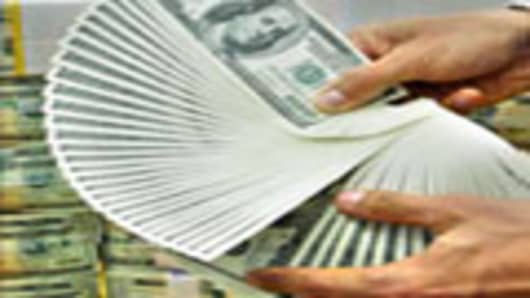Gilmore said the decline in the yen Tuesday was the result of weaker than expected data on Chinese industrial production.
Boris Schlossberg, director of currency research at GFT Forex, said the dollar's reversal could prove temporary, but either way it has been important.
"I think stocks, commodities, risk currencies, all got way ahead of themselves. What you're seeing now is a clear correction in the trend. I'm not a super dollar bull. I think come euro $1.40, you'll see some support there. We clearly made a turn. The question is whether it's a very serious turn, or a pause in the decline," said Schlossberg.
Schlossberg said the euro seems to have made an intermediate term top. "It ran into a pretty serious wall of resistance at $1.44. There is a confluence of factors that favor the dollar," said Schlossberg. The euro was at $1.4150 per dollar.
>>Slideshow: World's Weirdest Currencies
"We're starting to see a little bit of decoupling from the risk on, risk off trade. We're starting to see where good U.S. news means positive for the dollar," Schlossberg said.
Markets Mayhem
Traders have been expecting the stock market to pull back, now that the earnings season is winding down, but the question is how much will dip buyers support the market's 40 plus percent gains made since early March. The Dow Tuesday saw its biggest one day drop since July 7 and its lowest close since July 31.
As stocks sold off Tuesday, the biggest decliners were the financials, down 3.5 percent. Rochdale Securities analyst Richard Bove recommended taking short term profits in some bank stocks and said the stocks are trading on "fumes."
There was also some talk that a FASB meeting this coming Thursday could be a negative for the sector.
A spokesman for FASB said its board plans to discuss a proposal to have financial instruments carried at fair value on balance sheets. He said the proposal is very preliminary but the board could decide whether to create a draft rule and put it out for comment.
What Else to Watch
International trade data is released at 8:30 a.m. Wednesday. There are just a few key earnings Wednesday, including Macy's and Sara Lee.
The Treasury's auction of another $23 billion in 10-year notes Wednesday could be key for the markets. Not lost on investors is the fact that the auction results come just before the end of the Fed's two-day meeting and some traders expect this auction to be more difficult than the 3-year auction Tuesday.
Bill O'Donnell, who is RBS head Treasury strategist, said the 3-year auction drew a record amount of indirect bidders (which include foreign banks).
"I think the longer issues will do quite well. After the nonfarm payrolls (Friday) we did very well. We saw very good domestic fund manager buying in 30-year bonds and long strips. The trick is going to be tomorrow's auction. The reason being we get the FOMC statement 1 hour and 13 minutes after the results. That might temper the enthusiasm of some of the investors to participate, but I think that's only going to be a modest event," he said.
O'Donnell also said he expects the Fed to announce it will end its Treasury purchase program. "I think they will end it and that will calm the market," he said.
Commodities
Commodities were a mixed picture Tuesday, with some ag commodities higher and metals lower. Crude was lower, but gasoline was firmer. Corn gained slightly but soy beans were up more than 2.8 percent.
Carol Hurley, market strategist with Lind-Waldock, said she expects the USDA crop report Wednesday morning to be "bearish corn, bullish beans." The most recent estimate was 87 million acres of corn.
"They're looking at lower by about one million acres in corn and maybe to add some in soy beans. If the report has no surprises, they'll probably just start looking at weather, the dollar and the stock market," she said.
"With the great growing season, they are also expected to raise the yield forecast by four bushels per acre to 157 bushels," for corn, she said.
"The thing with beans is that China has been making record purchases so that's going to be supportive no matter what," said Hurley.
The Wall Street Journal reported Tuesday evening that the majority of a group of 53 economists it surveyed believe Fed Chairman Ben Bernanke should be reappointed for his handling of the economic crisis. They also said there is a 71 percent chance President Obama will ask him to stay on.
Echoing an increasingly common view, the economists also said the recession that began in December, 2007 is now over. Since the beginning of August, economists have been ratcheting up their view of third quarter and second half growth.
What to Watch (on TV)
"Squawk Box" Wednesday morning hosts an interesting trio, and it will be worth seeing if they think the recession has ended. Economist Nouriel Roubini, Marc Faber and Nassim Taleb will participate in the 7 a.m. hour.
Questions? Comments? marketinsider@cnbc.com



